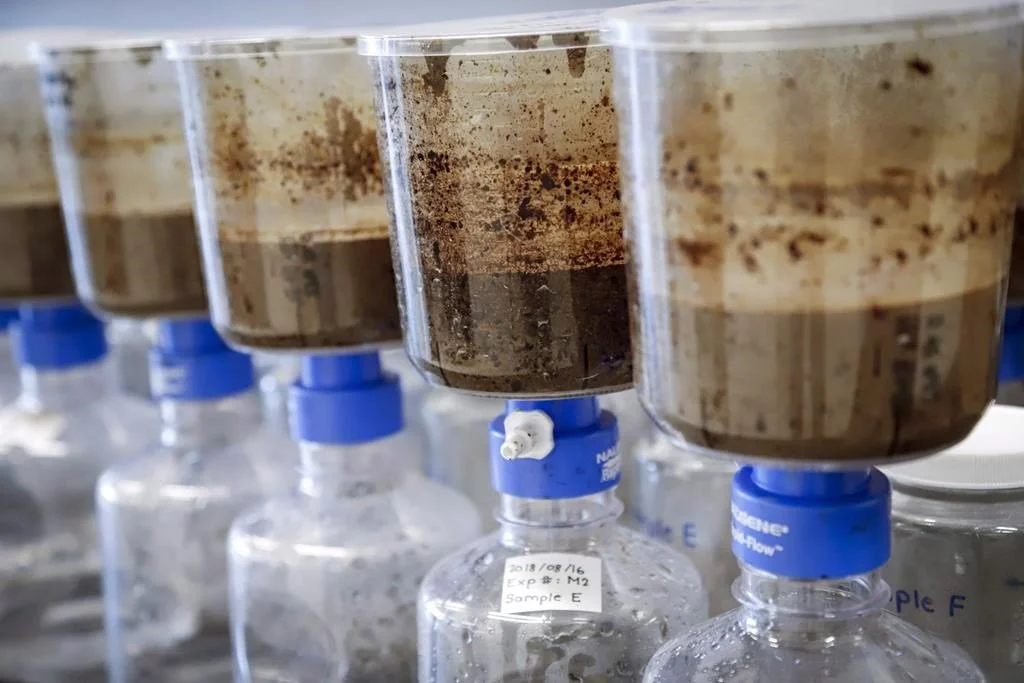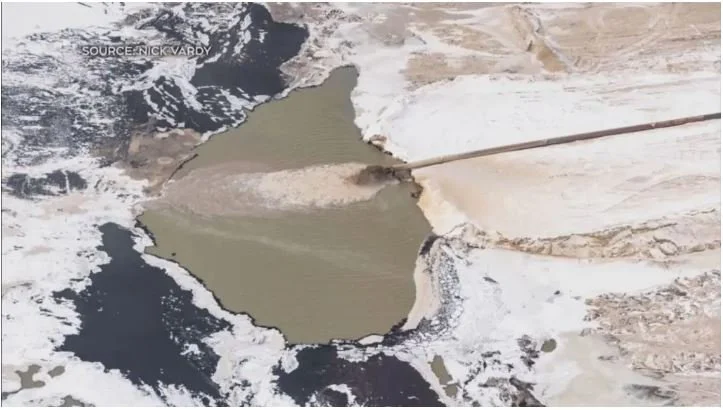The chief of the Athabasca Chipewyan First Nation is voicing his concern over yet another incident at the Kearl oilsands facility, located about a 90-minute drive north of Fort McMurray. In a statement issued Thursday, Chief Allan Adam said the Nov. 13 incident, involving water, has “once again impacted the environment on our traditional territories.”
Another spill at Kearl mine reported in northern Alberta
There has been another spill at Imperial Oil's Kearl facility in northern Alberta, the Alberta Energy Regulator (AER) has confirmed. "On Nov. 13, Imperial Oil reported to EDGE that there had been a release of water with Total Suspended Solids (TSS) more than their approved provincial regulatory limit from a sedimentation pond at their Kearl site," Teresa Broughton of AER wrote in an email to CTV News Edmonton. "Initial reports indicated approximately 670m3 of water was released into the Muskeg River."
Alberta Energy Regulator followed rules in Kearl mine wastewater release, report finds
A third-party report into the release of millions of litres of oilsands wastewater at Imperial Oil's Kearl mine has found the Alberta Energy Regulator followed its rules in keeping the public and area First Nations informed — but concludes those rules are significantly lacking. "There were no areas of non-adherence to stated policies and procedures," says the Deloitte report, prepared for the regulator's board.
Imperial Oil faces more water problems at Kearl oilsands mine, regulator warns
The Alberta Energy Regulator has warned Imperial Oil about more wastewater problems at its Kearl oilsands mine in northern Alberta. The regulator has issued a notice of non-compliance to the company after chemicals associated with oilsands tailings were found at an off-site well at levels that exceed provincial guidelines.
Canada opens formal investigation into Imperial's oilsands tailings leak in northern Alberta
Federal environmental authorities have launched a formal investigation into a tailings leak at Imperial Oil's Kearl oilsands mine in northern Alberta. Environment and Climate Change Canada (ECCC) announced Thursday it is investigating a suspected contravention of the Fisheries Act, which prohibits the "deposit of a deleterious substance into water frequented by fish," or any place where such substances could enter fish-bearing water.
Canada oil sands leak heightens First Nations' calls to clean up tailings
In early February, Chief Allan Adam of the Athabasca Chipewyan First Nation in northern Alberta started fielding calls from community members after the provincial regulator revealed toxic wastewater had been leaking for months from a tailings pond at Imperial Oil's Kearl oil sands mine. Many in the community hunt and fish downstream of Canada's huge bitumen mines, and wanted to know if the game meat in their freezers was safe to eat.
'Irritated' N.W.T. minister learned of Suncor spill into Athabasca River when media called
The N.W.T.'s environment minister says he only learned about a spill of nearly six million litres of water from a Suncor oilsands sediment pond into the Athabasca River when he received a call from the Globe and Mail. It's the second time the Alberta government has failed to notify the territory of a spill that could impact northern waters. It comes just weeks after news broke that Imperial Oil's Kearl mine had been leaking contaminated water for months.
‘They’re destroying us’: Indigenous communities fear toxic leaks from Canada oil industry
A recent string of leaks from tailings ponds at oil sands operations upstream has once again drawn attention to the profound transformation Canada’s largest industry has had on the region – and the distrust that comes with it. In May, Calgary-based Imperial Oil notified Alberta’s energy regulator it had discovered discoloured water near its Kearl oil sands project. The regulator soon concluded the water had come from tailings ponds where the company stored the toxic sludge-like byproducts of bitumen mining. Environmental samples showed high levels of several toxic contaminants, including arsenic, iron, sulphate and hydrocarbon – all of which exceeded provincial guidelines.
Northern Alberta oilsands tailings leak to face third-party probe, energy regulator says
The Alberta Energy Regulator says it's looking for an outside investigator to dig into a release of oilsands tailings water that wasn't made public for nine months. In a statement released Tuesday, the regulator said it's seeking a "qualified, impartial, third-party body" to consider how it notified First Nations, governments and other stakeholders about two releases at Imperial Oil's Kearl oilsands mine north of Fort McMurray, Alta.
Feds to provide bottled water, mental health services to First Nations dealing with tailings pond leak
The federal government is providing bottled water and mental health services to First Nations struggling to deal with a spill from a tar sands tailings pond that went unreported for months in northern Alberta. “They’re devastated and their communities are devastated,” Indigenous Services Canada Minister Patty Hajdu said at a press conference in Ottawa on Monday. “They’re afraid that the water is contaminated.
They planned a water summit. Then Kearl happened.
A Dene Nation water summit being held this week has taken on new urgency as delegates deal with the fallout from Imperial Oil’s Kearl tailings spills. The northern Alberta oil sands mine continues to operate but has now been ordered by the federal government to take immediate action to stop months-long seepage of wastewater. A separate release of millions of litres of tailings at the same site was also revealed last month.
Alberta premier says Imperial Oil should have disclosed tailings pond spills
Alberta's energy regulator may have ignored provincial law by not publicly disclosing that waste from a large oilsands tailings pond was escaping containment and seeping into groundwater, says a lawyer. Drew Yewchuk of the University of Calgary's Public Interest Law Clinic is asking the province's information and privacy commissioner to investigate how and why the Alberta Energy Regulator chose not to release information on the leak at Imperial Oil's Kearl mine, despite direction in provincial law to do so.
Water level at Sasamat Lake could drop by 2 metres if aging dam removed
Imperial Oil's dam on Sasamat Lake has been in place for a century, but the company says it's now considering its removal. The decision could have wide-ranging effects on the Port Moody, B.C., lake, which is a popular destination for Metro Vancouver residents. "We really don't have a need for the dam anymore,'' said Ali Tejpar, project manager of the Sasamat Lake Dam Project.
Fort Good Hope, N.W.T., leaders optimistic Imperial Oil visit marks turning point in relationship
Imperial Oil said it's going to start the process of renewing licences with the Sahtu Land and Water Board and the Canada Energy Regulator to operate in the Sahtu. The new permits would allow them to keep extracting oil in Norman Wells for another decade. An Imperial Oil representative declined to do an interview at the open house, saying staff were not trained to speak to the media.
Imperial Oil visiting Sahtu communities in N.W.T. this week
Imperial Oil is travelling to all five Sahtu communities in the N.W.T. this week for what it's calling "neighbour week." The 143-year-old company says the purpose of the visits are for people to learn about its oil operation in Norman Wells, N.W.T., to ask questions, and to provide feedback. Company representatives will be in Norman Wells on Monday, Fort Good Hope on Tuesday, Tulita on Wednesday, Délı̨nę on Thursday and Colville Lake on Friday.
Imperial Oil reporting spill in Norman Wells occurred under Mackenzie River
Nearly a month after the incident was first reported, Imperial Oil has confirmed that the produced water line that spilled in Norman Wells, N.W.T. is underneath the Mackenzie River. Cabin Radio first reported the leak's location. Imperial Oil said the cause of the leak is still being determined and that results from water sampling indicate there is no risk to public health or freshwater aquatic life downstream. In early August, residents in Fort Good Hope reported a fuel-like sheen and other surface contaminants spotted on the surface of the Mackenzie River.
16 days later, Imperial Oil still investigating if Norman Wells spill entered Mackenzie River
Imperial Oil is still investigating whether produced water that spilled at the Norman Wells, N.W.T. operation in late July has entered the Mackenzie River. A spokesperson for Imperial Oil said in an email that the company is monitoring the water quality and there are no indications there is a risk to public health. This comes after people downriver in Fort Good Hope reported surface contaminants on the water.
Imperial Oil still investigating cause of produced water spill in N.W.T.
Imperial Oil Ltd. says it is still investigating the cause and impact of a pipeline spill in the Northwest Territories that has some residents downstream concerned about the potential impact. The Calgary-based oil and gas company reported on July 27 that it discovered about 55,000 litres of produced water had spilled before it shut down the pipeline in Norman Wells, N.W.T.
Imperial Oil investigating 55,000-litre spill of produced water in N.W.T.
Neskantaga First Nation Still Doesn’t Have Clean Water
This past November marked 25 years since Neskantaga First Nation, located in Northwestern Ontario, was placed on a boil water advisory. In October 2020, over 250 Neskantaga residents were evacuated and transferred to a hotel in Thunder Bay after “an oily sheen was found in the Neskantaga water reservoir;” “high levels of hydrocarbons” were discovered in the water after testing. Residents were able to return after two months, but the boil water advisory remains. Chief Chris Moonias has called upon Ontario Premier Doug Ford to support Neskantaga First Nation in securing clean drinking water and properly trained water operators – Ford has yet to respond. Ending all boil-water advisories in Canada can no longer be delayed; Ford must act in accordance with the concerns of the Neskantaga First Nation immediately.





















